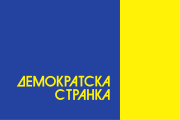Democratic Party Демократска странка | |
|---|---|
| Abbreviation | DS |
| President | Zoran Lutovac |
| Deputy President | Dragana Rakić |
| Vice-Presidents | |
| Parliamentary leader | Zoran Lutovac |
| Founder | The Founding Committee of the Democratic Party |
| Founded | 3 February 1990 |
| Registered | 27 July 1990 |
| Headquarters | Nušićeva 6/II, Belgrade |
| Newspaper | Bedem |
| Youth wing | Democratic Youth |
| Women's wing | Women's Forum |
| Ideology | Social democracy |
| Political position | Centre-left |
| European affiliation | Party of European Socialists (associate) |
| International affiliation | |
| Parliamentary group | Democratic Party |
| Colours |
|
| National Assembly | 8 / 250 |
| Assembly of Vojvodina | 2 / 120 |
| City Assembly of Belgrade | 2 / 110 |
| Party flag | |
 | |
| Website | |
| ds | |
The Democratic Party (Serbian: Демократска странка, romanized: Demokratska stranka; , abbr. DS) is a social democratic political party in Serbia. Zoran Lutovac has led the party as its president since 2018. The party is colloquially known as the žuti (yellows) because of one of its main colours.
DS was founded in 1990 by a group of intellectuals who sought to revive the Democratic Party, which was active in the Kingdom of Yugoslavia. Dragoljub Mićunović was the first president of DS until 1994 and under his leadership DS gained representation in the National Assembly of Serbia and took part in anti-government protests against Slobodan Milošević. After Zoran Đinđić's election as president of DS in 1994, DS was reorganised. Đinđić led the party into the Together coalition, and DS took part in the 1996–1997 protests that occurred after the Electoral Commission invalidated local election results in cities in which the Together coalition had won. DS later led the Alliance for Change, which became part of the Democratic Opposition of Serbia (DOS) in January 2000. DOS won the 2000 Yugoslav general election, but Milošević, the president of the Federal Republic of Yugoslavia and president of the Socialist Party of Serbia (SPS), declined to accept the results, culminating in his overthrow.
DS assumed power in Serbia after winning parliamentary elections in December 2000 and Đinđić then became prime minister. Đinđić was assassinated in March 2003 and succeeded by Boris Tadić as president of DS. Tadić also became president of Serbia while DS was in opposition from 2004 to 2007 when it became part of a coalition government led by DSS. Tadić led DS to victory in 2008 when a coalition government with SPS was formalised. DS was defeated by the Serbian Progressive Party in 2012 and went into opposition. Dragan Đilas became the president of DS in December 2012; he was ousted as mayor of Belgrade in 2013 but survived an internal motion of no confidence in January 2014. He was succeeded by Bojan Pajtić in May 2014. Dragan Šutanovac became the president of DS after Pajtić's resignation in 2016. Šutanovac was then succeeded by Lutovac in 2018. Lutovac led DS into several opposition coalitions and boycotted the 2020 parliamentary election, causing a schism in the party. He successfully led DS back into the National Assembly in the 2022 election.
DS was a catch-all party in its early years, occupying the centrist and centre-right position. It supported the establishment of a market economy, denationalisation, and union rights. DS shifted to a centrist and socially liberal profile under Tadić and became the leading party of the pro-European bloc of Serbian politics. It shifted towards social democracy in 2013, and is now positioned on the centre-left on the political spectrum. Its supporters tend to be female, high school or university educated, tolerant towards diversity, socially progressive, and opposed to authoritarianism and nationalism. DS is an associate member of the Party of European Socialists and a member of the Progressive Alliance and Socialist International.